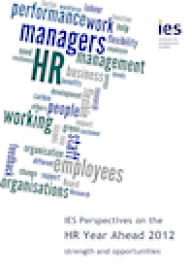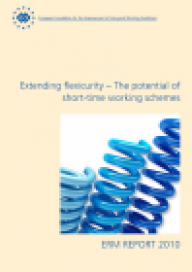Publications
 We author and publish a range of resources to keep you up to date with the latest developments in employment, labour market and human resource policy and practice.
We author and publish a range of resources to keep you up to date with the latest developments in employment, labour market and human resource policy and practice.
All our pdf publications are free to access.
Search results
-

IES Perspectives on the HR Year Ahead 2012
Strength and opportunities
Dec 2011 | Institute for Employment StudiesThis report looks at opportunities for change, whilst ensuring your workforce and managers are in a strong position to embark on them.
-

Leadership and worker involvement on the Olympic Park
Lucy D, Tamkin P, Tyers C, Hicks B | Sep 2011 | Health and Safety ExecutiveThe HSE commissioned this research into leadership and worker involvement across projects on the Olympic Park to understand the degree to which approaches impacted positively or negatively and could be transferable to other construction projects and industries. This research project sought to explore the range of initiatives and approaches used, their impact on worker involvement, attitudes and behaviours, and other desired outcomes and the context in which they were effective or ineffective.
-

Evaluation of the Duty to Manage Asbestos
Sinclair A, Tyers C, Hunt W, Oakley J, Pearmain D, Savage J, Bust P, Gibb A | Aug 2011 | Health and Safety Executive (HSE)This research evaluates the impact of the Duty to Manage asbestos in non-domestic premises. It aims to: establish levels of compliance with the Duty; establish the extent to which compliance by dutyholders has brought about improved work practices among maintenance workers; re-assess the assumptions made in the Regulatory Impact Assessment (RIA) which accompanied the introduction of the Regulations about costs/benefits of the duty; identify/investigate factors influencing dutyholders' compliance with the Duty and examine any barriers to compliance; and determine the proportion of non-domestic and domestic rented premises which contain asbestos and the rate at which this is being removed.
-

Volunteering: Supporting transitions
Newton B, Oakley J, Pollard E | Apr 2011 | v inspiredIn Autumn 2010, v commissioned the Institute for Employment Studies to explore the unique contribution of volunteering to the development of employability skills and attributes, networks and contacts, qualifications and accreditation, and the relief of the negative consequences of unemployment or inactivity.
-
📄
Impact of interfirm relationships – employment and working conditions: A literature review
Martin R, Marchington M, Grimshaw D, Hadjivassiliou K, Cox A | Apr 2011 | European Foundation for the Improvement of Living and Working ConditionsThis literature review aims both to provide an up-to-date synthesis of, and contribute to, the relevant debates by analysing the varied effects of five types of interfirm relationships: public-private partnerships (PPPs), joint ventures, strategic alliances, clusters and virtual company networks (VCNs). The review uses existing literature to illustrate likely effects of each type of relationship on employment practices and working conditions.
-
📄
Impact of interfirm relationships – employment and working conditions
Hadjivassiliou K, Cox A, Martin R, Marchington M, Sheehan M, Gloster R, Pollard E, Grimshaw D, Rubery J | Apr 2011 | European Foundation for the Improvement of Living and Working ConditionsThis study was commissioned by the European Foundation for the Improvement of Living and Working Conditions (Eurofound) in February 2010. Its purpose was the in-depth study of the impact of five types of interfirm relationships – joint ventures, clusters, public-private partnerships (PPPs), strategic alliances/networks and virtual company networks (VCNs) – on employment and working conditions.
-
📄
Achieving Change Using the Supply Chain Model in Construction
Wilson S, Tyers C | Feb 2011 | Health and Safety Executive (HSE)The Health and Safety Executive has been working in partnership with the construction industry since the 1990s to bring about improvements in risk management by developing solutions together. One aspect of this is an initiative called the supply chain model, which attempts to take a cohesive approach by drawing together stakeholders from across the construction industry, such as suppliers, contractors, clients (from both the public and private sectors) and designers/architects. In 2009 HSE commissioned the Institute for Employment Studies to undertake a qualitative evaluation of the supply chain initiative and its component work strands. This report presents the evaluation’s findings.
-

Employment and Support Allowance: Customer and Staff experiences of the face-to-face Work Capability Assessment and Work-Focused Health-Related Assessment
Barnes H, Aston J, Williams C | Nov 2010 | Department for Work and PensionsThis report presents findings from qualitative research on the Work Capability Assessment (WCA) and Work-Focused Health-Related Assessment (WFHRA). The research was carried out in spring/summer 2010 and included Employment and Support Allowance customers, Jobcentre Plus and Pathways to Work Provider Personal Advisers, and Atos Healthcare staff working on these assessments.
-
📄
Work-Related Stress
Broughton A | Oct 2010 | European Foundation for the Improvement of Living and Working Conditions, DublinThis report examines the issue of work-related stress in the 27 EU Member States and Norway. Studies capturing data on work-related stress in individual countries differ in terms of their scope, methodology and coverage.
-

Extending flexicurity
The potential of short-time working schemes
Mandl I, Storrie D, Hurley J, Mascherini M, Broughton A, Owczarzak R, Riso S, Salvatore L | Oct 2010 | European Monitoring Centre on ChangeIn the face of recession, falling demand and the consequent slowing of production, short-time working and temporary layoff schemes have been extended (or introduced) in many Member States. These schemes, often with the aid of public funds, reduce working time, while protecting workers’ incomes and company solvency; frequently, the time spent not working is used for training instead. This report examines the practice of reduced working time across Europe, and looks in detail at how it is implemented in ten Member States, with a view to determining the contribution that such schemes can make in implementing the common principles of flexicurity, especially in light of the broad-based consensus they enjoy among the social partners.
